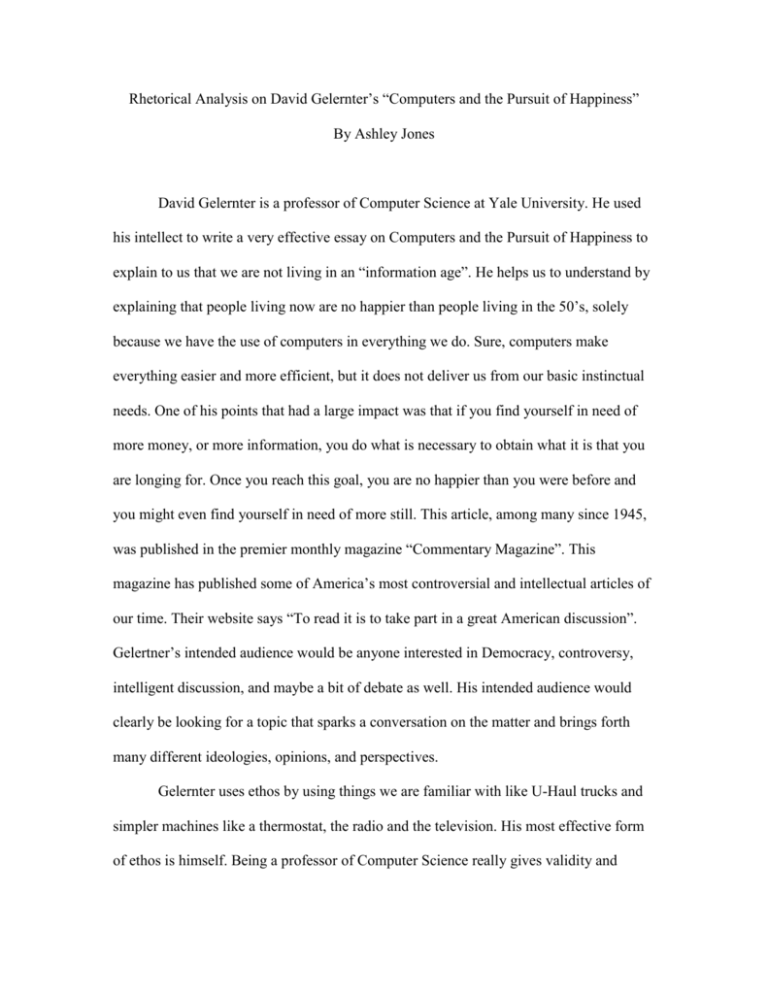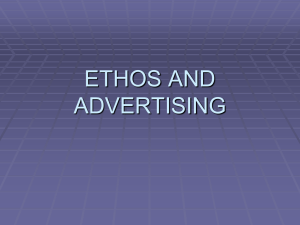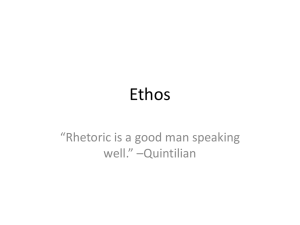Rhetorical Analysis on David Gelernter`s “Computers and the Pursuit
advertisement

Rhetorical Analysis on David Gelernter’s “Computers and the Pursuit of Happiness” By Ashley Jones David Gelernter is a professor of Computer Science at Yale University. He used his intellect to write a very effective essay on Computers and the Pursuit of Happiness to explain to us that we are not living in an “information age”. He helps us to understand by explaining that people living now are no happier than people living in the 50’s, solely because we have the use of computers in everything we do. Sure, computers make everything easier and more efficient, but it does not deliver us from our basic instinctual needs. One of his points that had a large impact was that if you find yourself in need of more money, or more information, you do what is necessary to obtain what it is that you are longing for. Once you reach this goal, you are no happier than you were before and you might even find yourself in need of more still. This article, among many since 1945, was published in the premier monthly magazine “Commentary Magazine”. This magazine has published some of America’s most controversial and intellectual articles of our time. Their website says “To read it is to take part in a great American discussion”. Gelertner’s intended audience would be anyone interested in Democracy, controversy, intelligent discussion, and maybe a bit of debate as well. His intended audience would clearly be looking for a topic that sparks a conversation on the matter and brings forth many different ideologies, opinions, and perspectives. Gelernter uses ethos by using things we are familiar with like U-Haul trucks and simpler machines like a thermostat, the radio and the television. His most effective form of ethos is himself. Being a professor of Computer Science really gives validity and credibility to what he is trying to convey, whether you agree with him or not. His use of ethos allows us to have faith and trust in what he is saying, and gives us the opportunity to connect to the topic. First and foremost, this is a man that we can put a lot of our faith in the fact that he knows what he is talking about. It is his career to. Secondly, he opens our eyes to the fact that we have had information and technology for a long time. At least the past 100 years, “if at all” he says. Computers are not the first forms of technological advancement that humans have invented, and they are certainly not the last. David grips us with pathos by stating that it is not computers and technology that makes us happy, not computers and technology that feeds us, protects us, and loves us, rather that we are the ones that do. Always have and always will, with or without the use of computers and our technological advancements. He speaks to his audience by connecting our basic human needs to the fact that computers will not fulfill these needs. He doesn’t deny that computers connect us. We can see for ourselves that by facilitating the services of social networking sites like Facebook, Twitter, Myspace, even dating profiles etc that we are able to keep closer contact with relatives and friends that are geologically far from us and even meet new people and start new relationships. However, this does not replace real, raw, human contact, which we cannot debate that we all need in order to be mentally healthy and stable beings. Where it is not impossible to build a robot who is programmed to have emotion, feeling, and thought, it would be very hard to produce one who could have emotion, feeling, and thought independently. Even then, at the end of the day you would still just have a machine with a mind and heart made of metal and wheels. Gelertner uses logos right of the bat by stating that we are not living in an information age, and that computers are not a revolutionary development simply because they did not just sprout up over night and change the world and the way we live our lives. He connects to us logically by speaking to our logical mind by giving us cold hard fact. We have always been building and creating new technologies that shape our existence and open the door for future inventions since the beginning of our race. It is not only now that we live in an age where information and technology is everywhere. He does not claim that information is not a good thing just that it is not revolutionary. There have been many things leading up to the existence of computers. Everything that is put into a computer, we had to have known prior, or else it would not exist inside the computer. Basically, a computer is a enormous consolidation of all the known information in the world, and nothing more. Computers and machines have always been around, it is just human nature to take a good thing and make it better. We will continue to build, create, and invent. It is what we do. The point is that computers, machines, technology, and information have always been around. It is not just at the present time that we are embarking on some new discovery. We possessed the information inside a computer long before the computer simply because we are intelligent beings. We ARE information and technology and computers are the bi-product. As the human race grows, so will our advancements in technology. The imperative thing we must always remember is to always keep a good balance. All is good in moderation.








